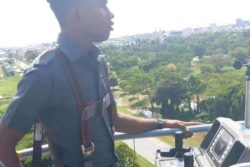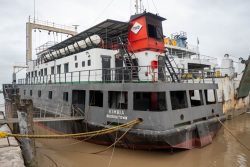With fifteen dialysis machines already in the country and bids to construct a comprehensive medical facility currently being considered, the Central Islamic Organisation (CIOG) is finally pushing ahead with plans to offer affordable dialyzed care here.
The high cost of dialysis locally, around US$180 per session, and an increasing number of patients unable to afford it triggered concerns within CIOG close to two years ago, but funding posed an initial stumbling block according to CIOG President, Fazeel Feroze.
CIOG’s initial proposal to construct and operate a medical centre failed to pull in financial backing in the early months, Feroze said, but it was later accepted by the Islamic Development Bank of Saudi Arabia. He said that they have signed an agreement with the bank, which has previously funded the construction of four Islamic schools across the country.
Speaking to Stabroek News in a recent interview, Feroze said that CIOG is currently trying to get the transport for the land in its name. He explained that the land has been donated by the Trustees of the General Council of Islamic Brother-hood, an organization that has not been operational for some time. According to Feroze, CIOG approached the trustees and was able to secure their consent to transfer the land. He added that CIOG had to produce evidence that it has funding for the project before the consent was given.
The building would be constructed at 227 Thomas Street opposite St. Ann’s Orphanage, but he pointed out that CIOG has not actually received any funds as yet. The organization expects an initial tranche after a bid is selected and the Saudi Islamic bank is made aware. He noted that the tender process closed on July 31 and that they are examining the various bids received which is expected to last for some two weeks.
Feroze said construction will commence as soon as the donors are informed of the winning bid and funds are released, but in addition to the funding from the bank he stated that CIOG has also received a pledge from a Guyanese philanthropist living in the UK who has agreed to donate US$500,000 to the project. “We already have a plan and design the next step after that is to put up the building. We hope to put up the building and then initiate the first phase of the medical centre, which is dialysis care,” he stated.
Feroze noted that the aim of the CIOG project is to bring the cost down for dialysis treatment. They are projecting a fee of about US$100 or less per session since patients in need of treatment require three sessions a week. However, he said that the organization is fully aware of persons in the society who are still not in a position to pay anything for treatment.
“We know of those persons who cannot afford it, but they will need to apply directly to CIOG not to the centre because the dialysis centre will only take cash and cheques. We will set up a unit to deal with needy cases and also lobby government to see whether NIS will honour contributions for those in need of such care,” he said.
The CIOG President explained that the organization has consulted widely on the project including with government officials here and that they have received a positive feedback.
Why dialysis?
Feroze said that the lifestyle patterns of Guyanese have shown a steady increase in non-communicable diseases that result in kidney failure. He said that the populace is being afflicted in greater numbers, adding that more awareness is needed.
He said that CIOG understands how important it is to have affordable dialyzed care in the country and is therefore “pressing forward in spite of the dismal projections.”
According to Feroze, some people have actually predicted that the project would be the death of CIOG due to the high cost of sustaining it. He said that persons have commented openly that resources within the organization will shift away from current projects the organization has set out to do when the center is operational. “Our programmes face the risk of being wiped out, at least that is what has been said,” he noted.
But Feroze pointed out that CIOG is depending on the continued support of its donor in addition to further support from the other agencies that “we are hoping reach out to us.” He explained that Dr. Mursulin Gaffor of Canada was able to secure the donation of fifteen dialysis machines from Oakville Hospital in Canada while the Canadian Support Group of CIOG collected some funds from Human Concern International. Further, he said that Dinesh Uniyal, a consultant in Canada has also located some more machines for CIOG which are in Canada awaiting shipment.
He said that they intend to get the service of a Nephrologist, who would be added to the medical landscape in the country, since there is no such expert in the country. Additionally he said that they are hoping to get medical nurses trained to run the centre. He mentioned that CIOG would have to create a link with the Georgetown Public Hospital, and that the organisation may have to donate some machines to hospital in the event that a patient is transferred there.
Cost recovery
Feroze explained that second phase of the project is to set up a diagnostic centre with X-ray, MRI, CT scan and blood testing facilities. But they are yet to see the funds for this leg of the project. He said that they are trying to access donations from supportive organizations abroad and hospitals particularly in US. The third phase is to have medical services that cater specifically for women such as obstetrics and gynecology.
He noted that these two latter phases of the project are expected to be cost recovery and “subsidize the dialysis service.” He stressed that medical services would be open to all Guyanese, not exclusive to Muslims.
Feroze said that a board would be set up to run the institution which would reflect the diversity of the project. He said that they are also looking at partners to help them run the centre and help in cost recovery.
The entire proposal for the dialysis centre was US$12M, he noted, but pointed out that some money would have to be discounted given that the machines were donated. The building is expected to cost US$2M.
In addition, Feroze said that the machines which are in Guyana are in storage and have to be serviced frequently because they have been lying there for almost six months. He said too that CIOG also has to secure funding for a water treatment plant for the dialysis centre, which he stressed as particularly crucial to the project. He noted that after consultations CIOG has been advised that the plant could cost up to US$350,000. “We have to find donations for that because we don’t have those funds. What we are looking for are partners to work with. We are appealing for corporate support here and those abroad and for anyone to contact us if they have suggestions, donations, etc,” he added.







